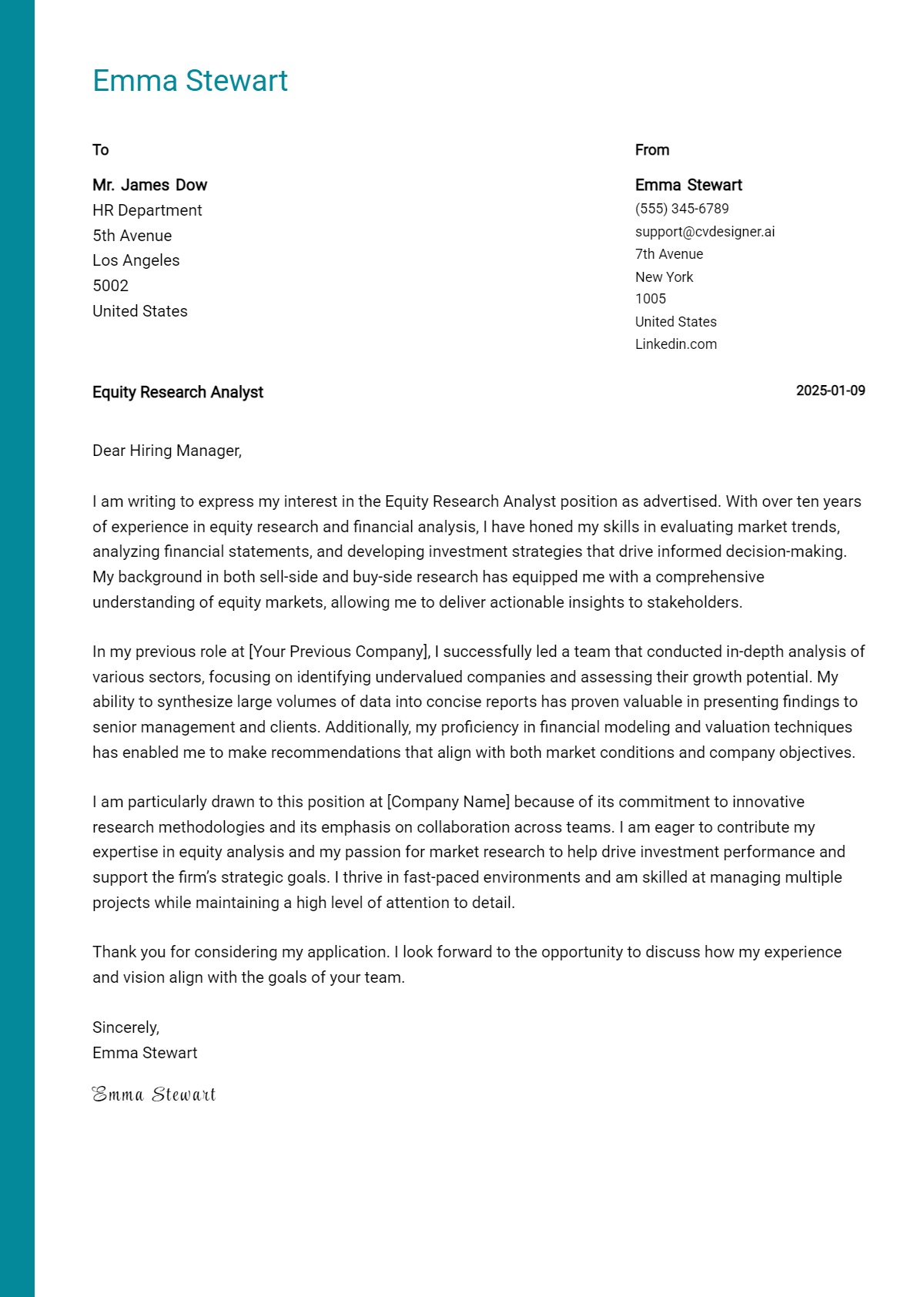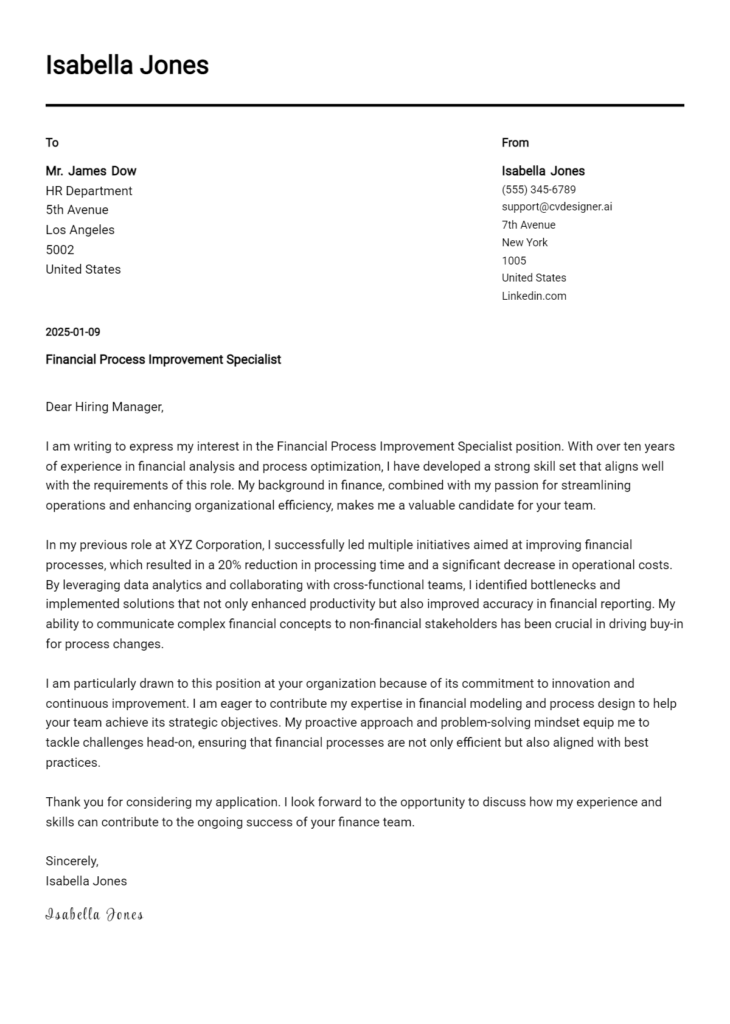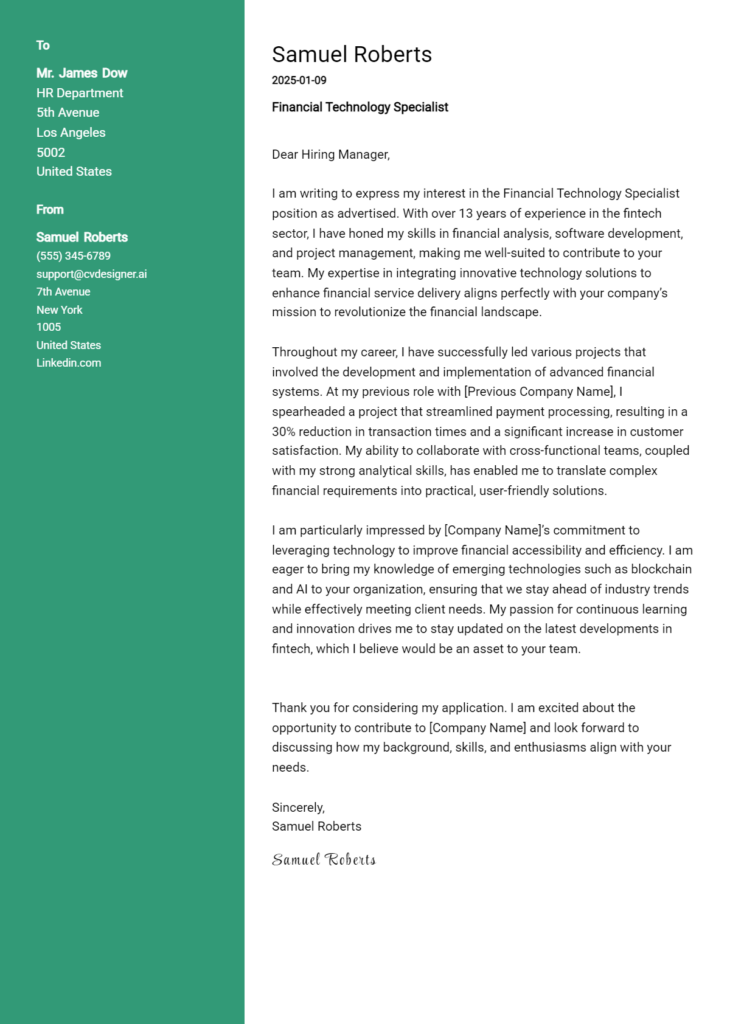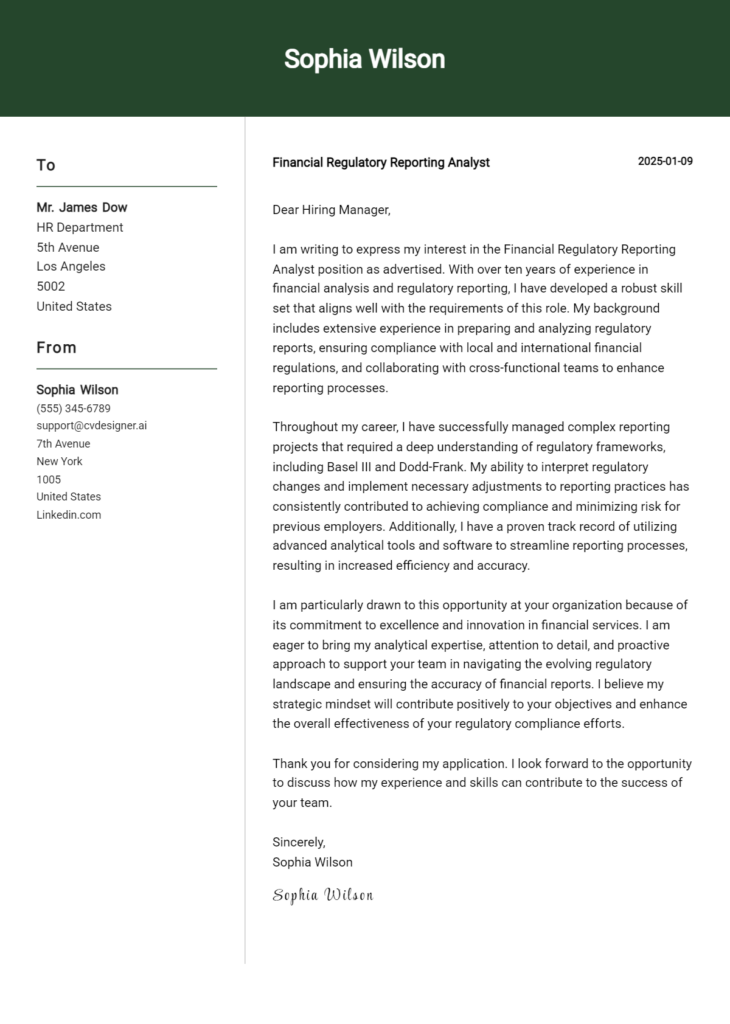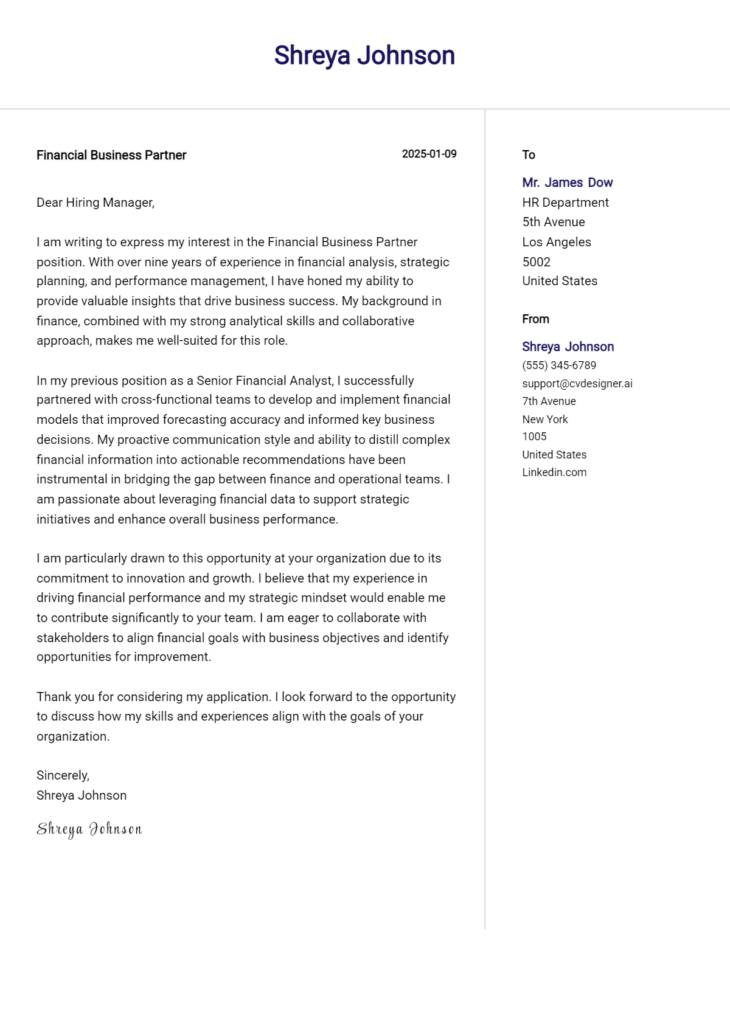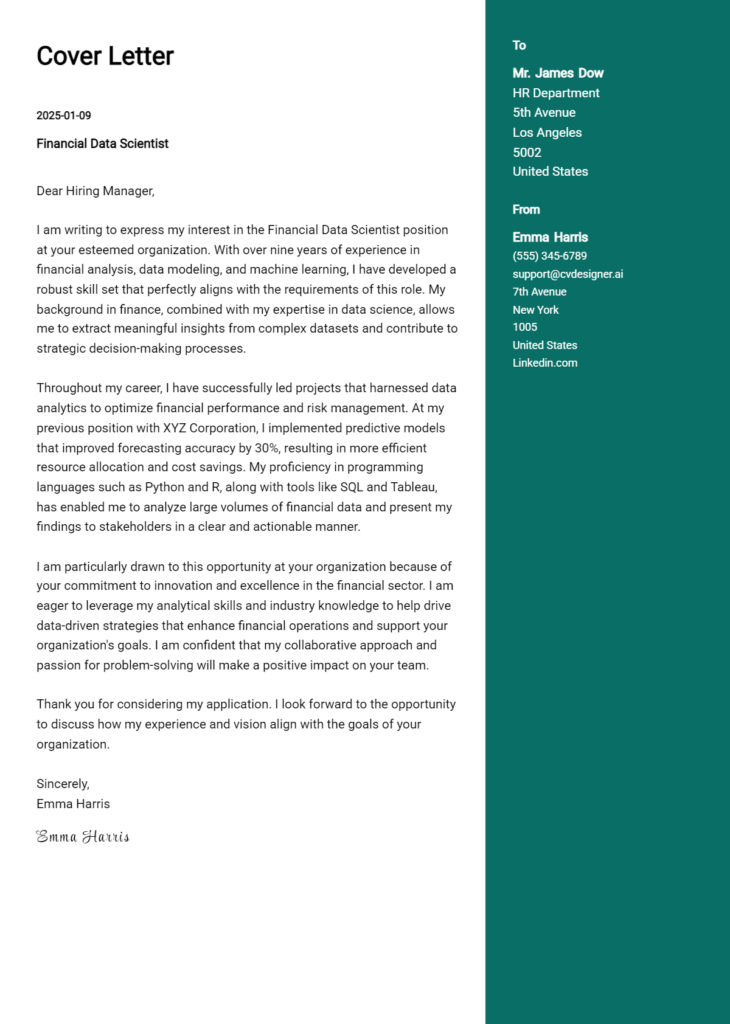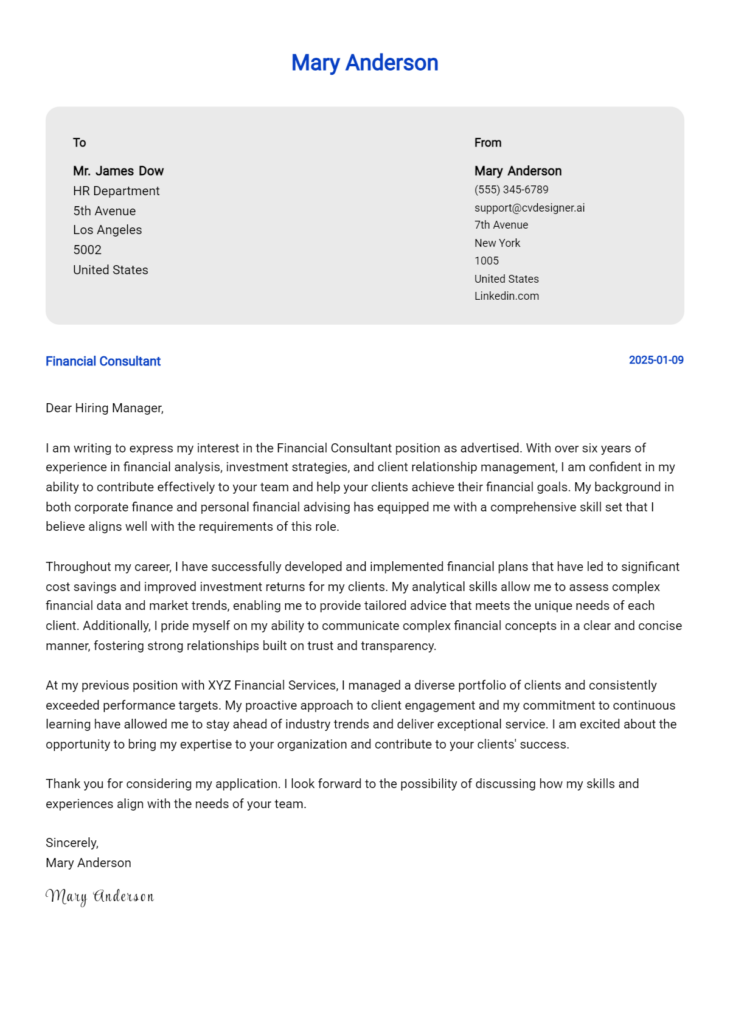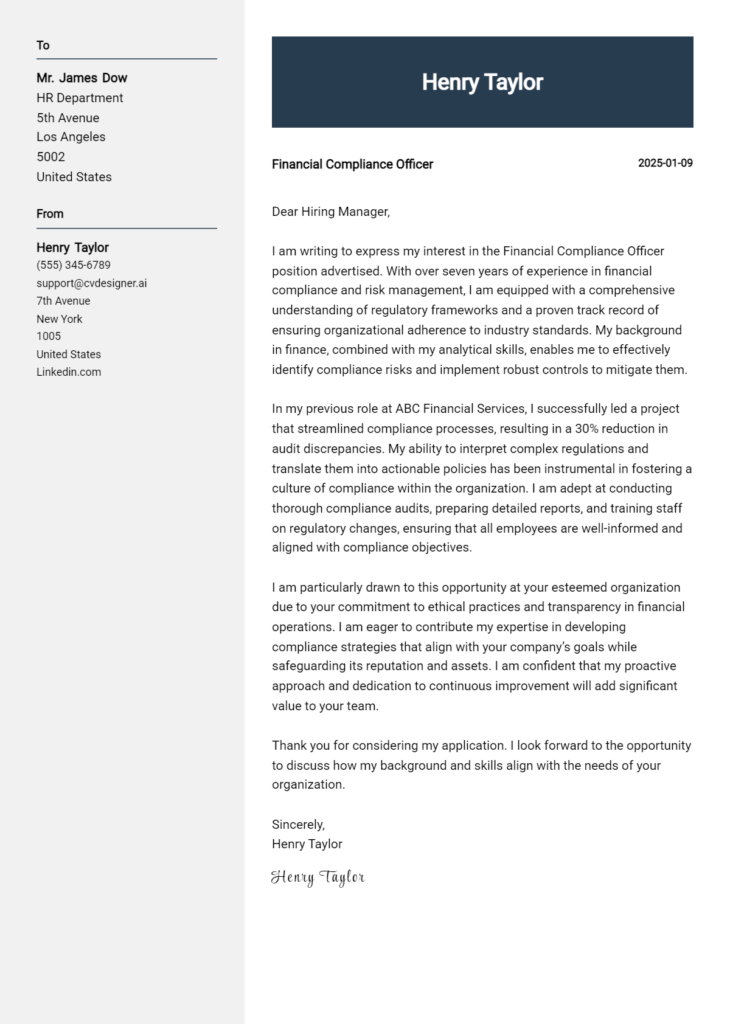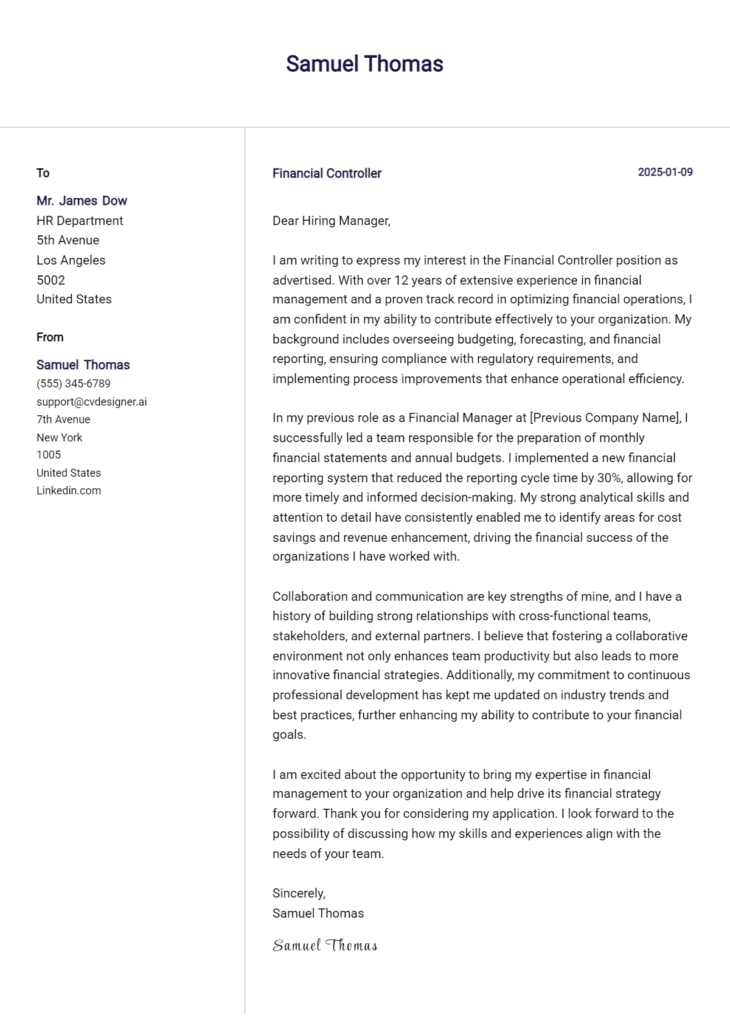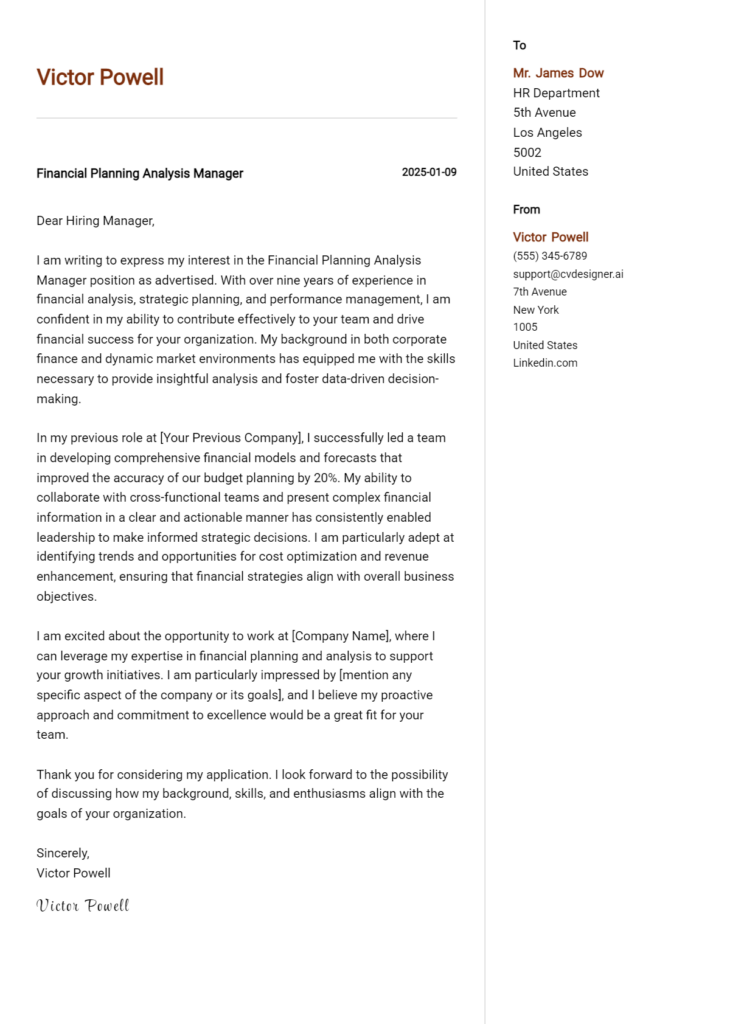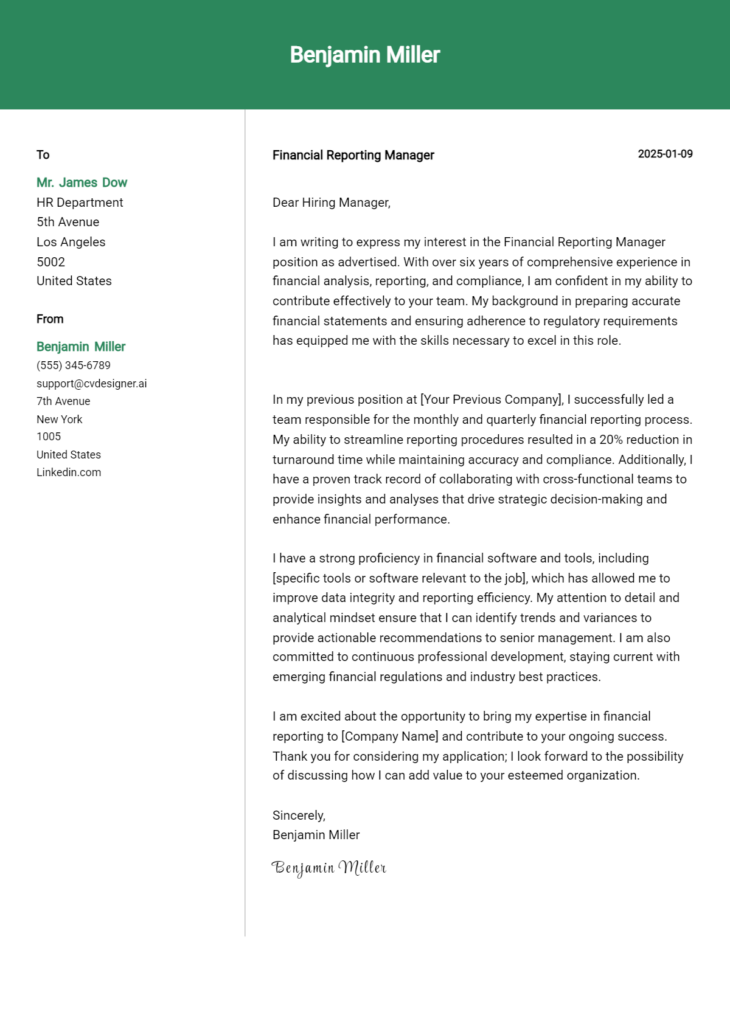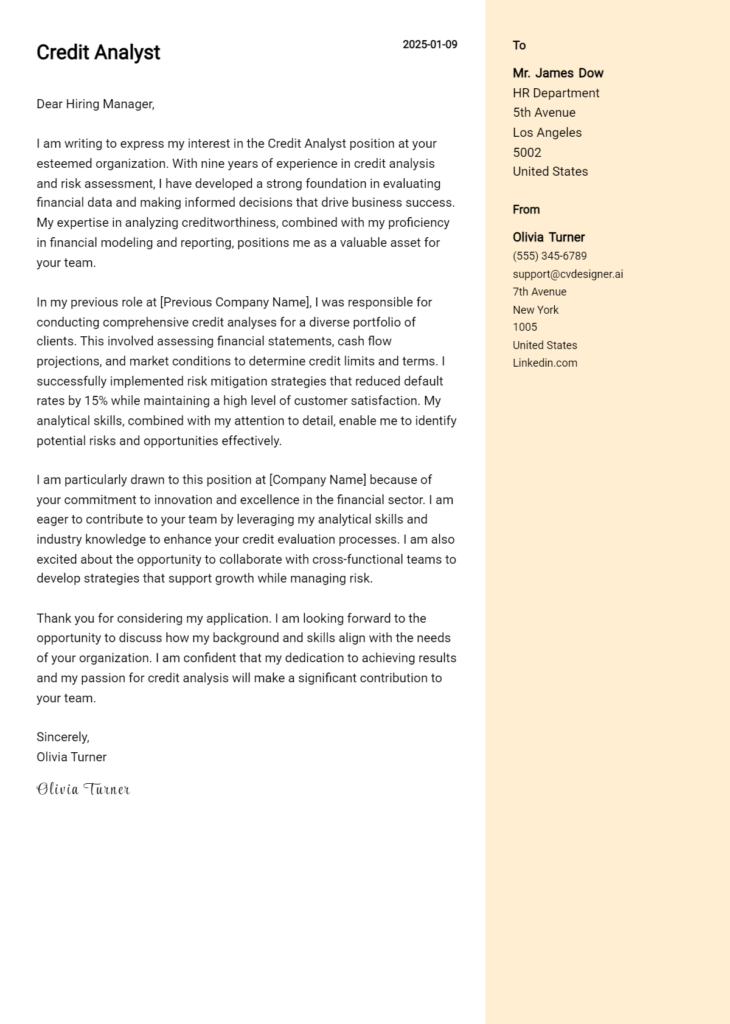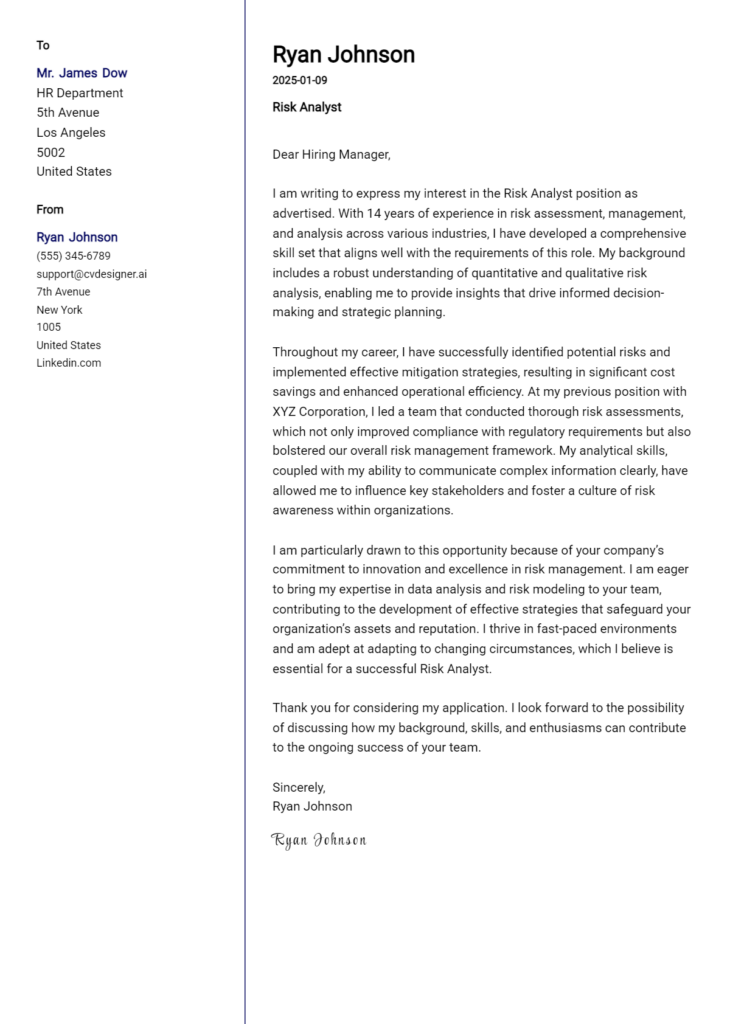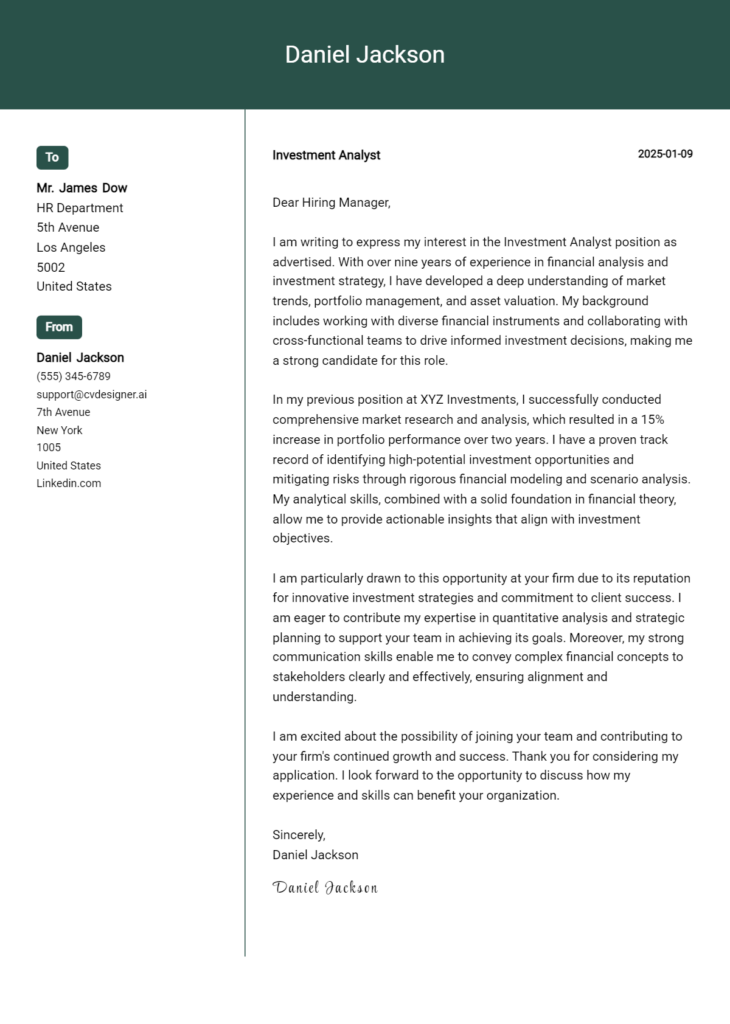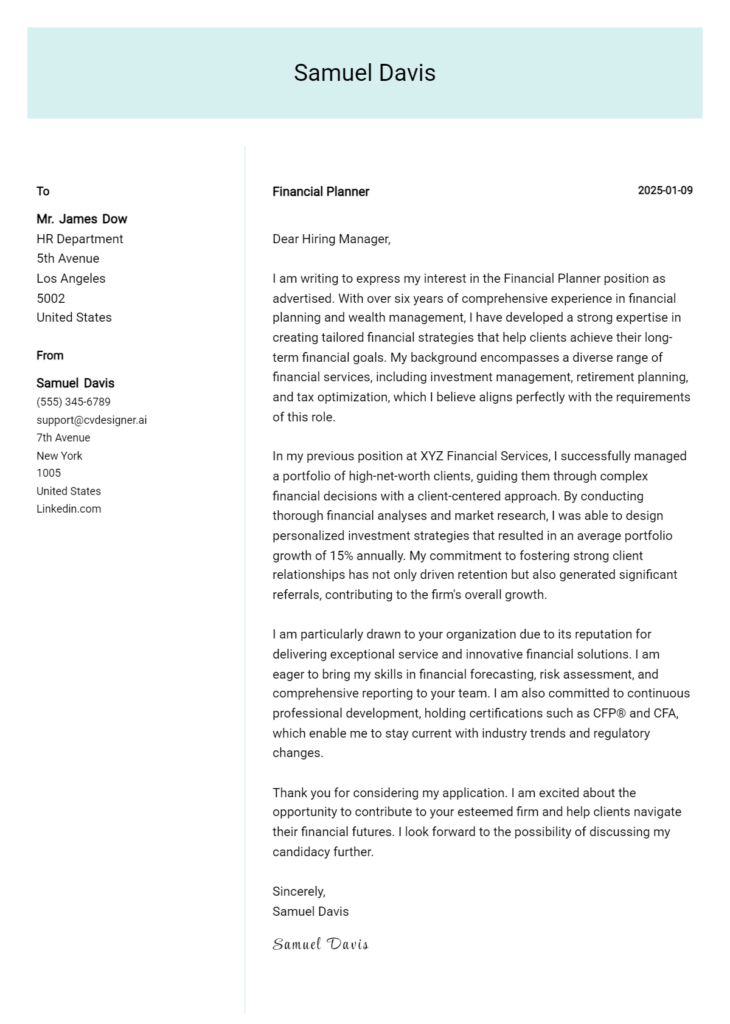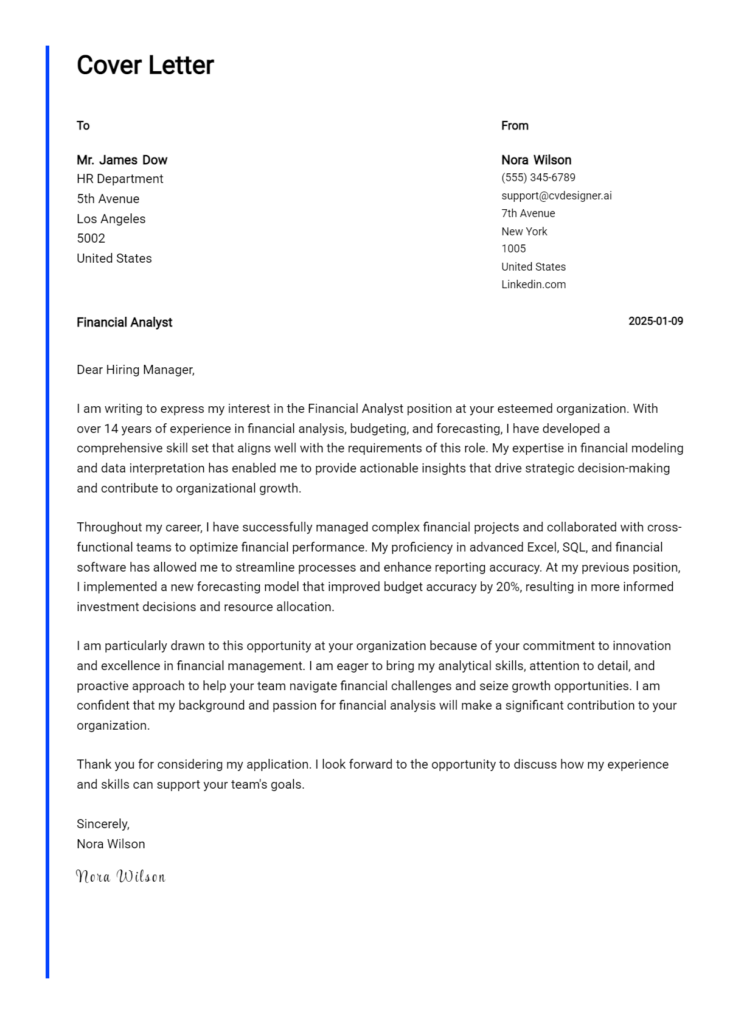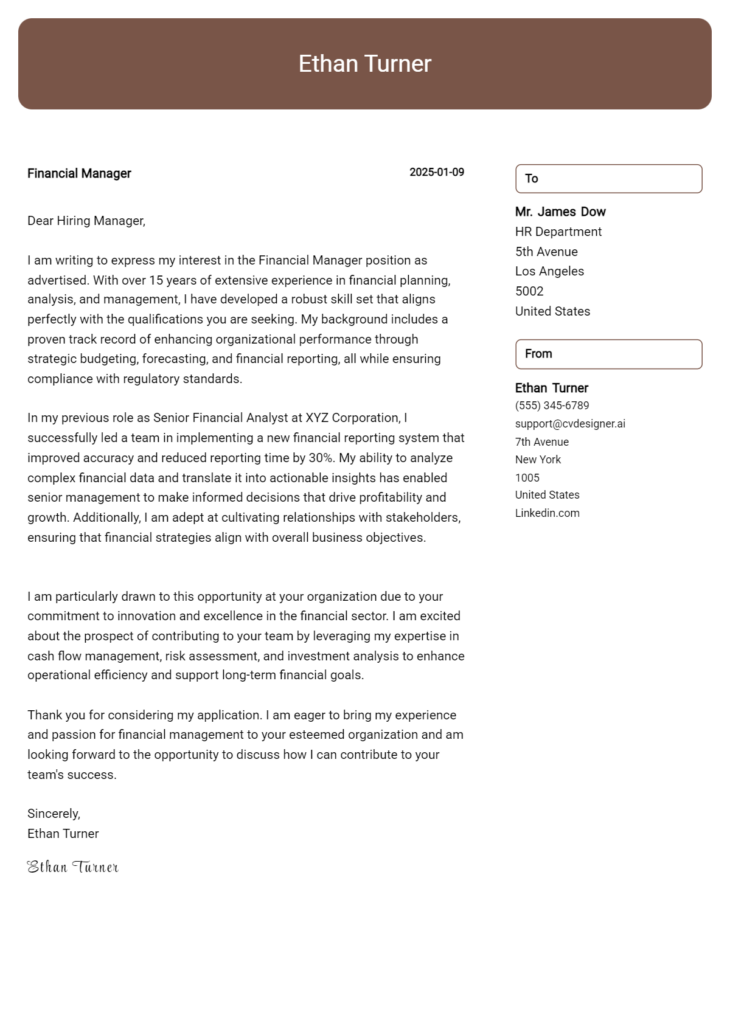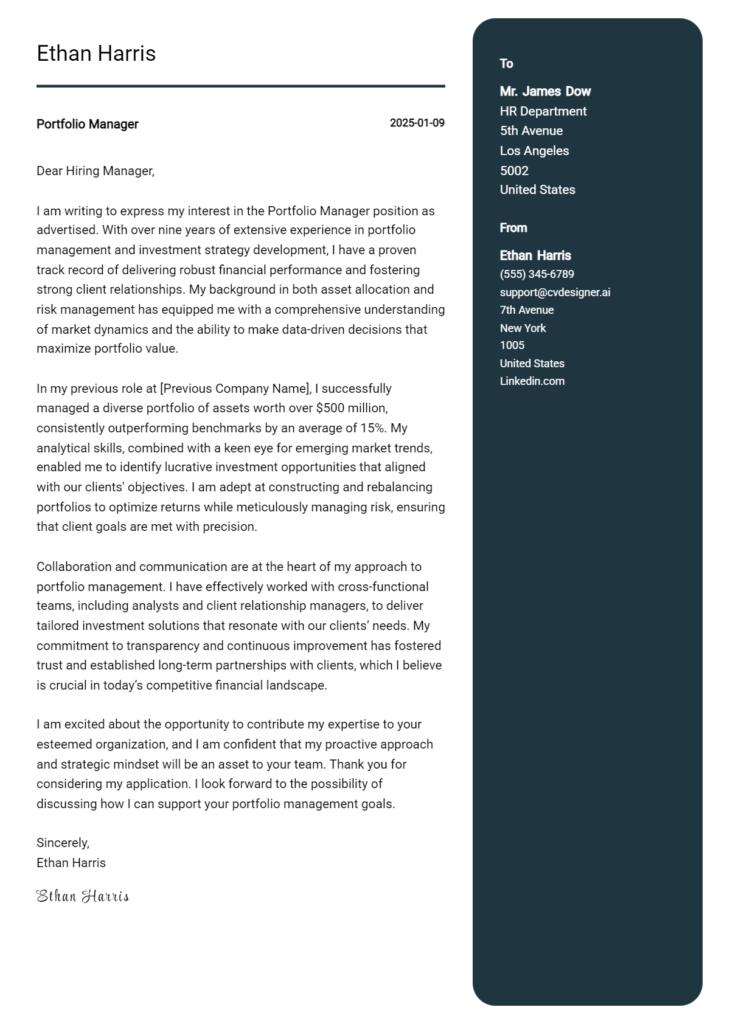Equity Research Analyst Cover Letter Examples
Explore additional Equity Research Analyst cover letter samples and guides and see what works for your level of experience or role.
How to Format an Equity Research Analyst Cover Letter?
Crafting a well-structured cover letter is essential for an Equity Research Analyst, as it serves as your first impression and reflects your analytical abilities and attention to detail. A polished cover letter not only showcases your qualifications but also demonstrates your understanding of financial markets and your ability to communicate complex information clearly. Given the competitive nature of the finance industry, the format of your cover letter can significantly impact how hiring managers perceive your capabilities.
In this guide, we will outline the key components of an effective cover letter for an Equity Research Analyst position, providing insights and industry-specific examples to help you create a standout document.
We will focus on the essential elements of a professional cover letter, including:
- Cover Letter Header
- Cover Letter Greeting
- Cover Letter Introduction
- Cover Letter Body
- Cover Letter Closing
Each section plays a crucial role in presenting your qualifications and professionalism. Let’s delve into each part and explore how to elevate your Equity Research Analyst cover letter.
Importance of the Cover Letter Header for an Equity Research Analyst
The cover letter header is a crucial element for an Equity Research Analyst as it not only sets the tone for your application but also provides essential information that facilitates communication. A well-structured header should include your contact information, the date, and the recipient's details to ensure clarity and professionalism. This format helps hiring managers quickly identify who you are and how to reach you, while also demonstrating your attention to detail—an important trait for a role focused on financial analysis and reporting.
A strong header exudes professionalism and confidence, while a weak one can create a negative first impression, potentially overshadowing your qualifications. Below are examples of a strong and weak cover letter header for an Equity Research Analyst position.
Strong Example
John Doe 123 Finance St. New York, NY 10001 john.doe@email.com (123) 456-7890 October 1, 2023 Jane Smith Hiring Manager XYZ Investment Firm 456 Market Blvd. New York, NY 10002
Weak Example
JD NY jd@email.com 10/1/23 Manager XYZ Firm
The Importance of the Cover Letter Greeting
The greeting in a cover letter plays a crucial role in setting the tone for the entire document. It is often the first impression a hiring manager receives, and it demonstrates the level of professionalism and personalization that the applicant brings to the table. By addressing the hiring manager directly, you establish a connection that can engage the reader and encourage them to continue reading. To make a strong impact, avoid generic greetings like "To Whom It May Concern" or "Dear Hiring Manager." Instead, take the time to research the recipient's name and use it in your greeting. This small effort can significantly enhance the personal touch of your cover letter, showing that you are genuinely interested in the position and the company.
Strong Greeting Example
Dear Mr. Smith,
Weak Greeting Example
To Whom It May Concern,
The Importance of a Compelling Cover Letter Introduction for an Equity Research Analyst
A well-crafted cover letter introduction is crucial for an Equity Research Analyst position, as it serves as the first impression to the hiring manager. In a competitive job market, capturing attention from the outset can make a significant difference. An effective introduction not only expresses genuine interest in the role but also highlights key skills or achievements relevant to the position. This sets the tone for the rest of the cover letter and can differentiate a candidate from others. Below are examples of strong and weak cover letter introductions for an Equity Research Analyst position.
Strong Example
Dear [Hiring Manager's Name], I am excited to apply for the Equity Research Analyst position at [Company Name], where my robust analytical skills and passion for financial markets can contribute to your team’s success. With over five years of experience in equity analysis and a proven track record of delivering insightful research reports that have influenced investment decisions, I am eager to leverage my expertise in identifying market trends and evaluating company performance for your esteemed firm.
Weak Example
To whom it may concern, I saw the job opening for an Equity Research Analyst and thought it might be interesting. I have some experience in finance and can do research. I hope to hear back from you soon.
Purpose of the Cover Letter Body for an Equity Research Analyst
The cover letter body for an Equity Research Analyst serves as a critical platform to showcase the candidate's analytical skills, relevant experiences, and overall value to the prospective employer. This section should effectively communicate the applicant's understanding of market trends, financial modeling, and investment strategies, as well as highlight specific projects or accomplishments that demonstrate their capabilities. By detailing successful analyses, investment recommendations, or collaborative research efforts, the candidate can illustrate their potential contributions to the company's research team and help drive informed decision-making.
Strong Example
I am excited to apply for the Equity Research Analyst position at XYZ Capital. In my previous role at ABC Investments, I successfully led a team to analyze the technology sector, resulting in a 25% return on investment for our clients. My in-depth research on emerging tech companies allowed us to identify undervalued stocks and recommend strategic investments. Additionally, I developed a comprehensive financial model that enhanced our forecasting accuracy by 15%. I believe my strong analytical skills and proven track record in delivering actionable insights would add significant value to your team.
Weak Example
I want to work at XYZ Capital because I have an interest in equity research. I have done some analysis in the past but I don't have any specific examples to share. I believe I can be a good fit because I am a hard worker and I am willing to learn. I think your company is great and I hope to contribute in any way I can.
Importance of the Cover Letter Closing for an Equity Research Analyst
The closing paragraph of a cover letter is crucial as it serves to summarize your qualifications, reiterate your enthusiasm for the position, and encourage the employer to take the next steps, such as reviewing your resume or scheduling an interview. A strong closing not only reinforces your fit for the role but also leaves a lasting impression on the hiring manager. In contrast, a weak closing may miss these key elements and fail to motivate the employer to engage further.
Strong Example
Thank you for considering my application for the Equity Research Analyst position at [Company Name]. With my extensive background in financial analysis, strong quantitative skills, and passion for market research, I am excited about the opportunity to contribute to your team. I look forward to discussing how my experience aligns with your needs and how I can help drive impactful investment decisions. Please feel free to review my attached resume, and I hope to schedule an interview soon to explore this opportunity further.
Weak Example
Thanks for looking at my application. I think I would be a good fit for the Equity Research Analyst role. I hope you consider my resume and get back to me if you're interested.
These tips will assist candidates in crafting an effective cover letter for an Equity Research Analyst position, emphasizing the importance of showcasing technical skills, problem-solving abilities, understanding of the Software Development Life Cycle (SDLC), teamwork capabilities, and a passion for continuous learning. A well-structured cover letter can set you apart from other applicants and demonstrate your readiness for the challenges of this analytical role.
Cover Letter Writing Tips for Equity Research Analyst
Highlight Technical Skills: Clearly articulate your technical proficiency in financial modeling, valuation techniques, and data analysis tools. Mention any relevant software experience, such as Excel, Bloomberg, or SQL, and provide specific examples of how you have utilized these skills in previous roles or academic projects. This will demonstrate your capability to conduct thorough equity analysis.
Showcase Problem-Solving Abilities: Describe instances where you have tackled complex financial problems or made strategic recommendations based on your analysis. Use quantifiable results to illustrate your impact, such as "developed an investment thesis that resulted in a 15% return over six months." This not only showcases your analytical skills but also your ability to think critically under pressure.
Demonstrate SDLC Knowledge: If applicable, mention your understanding of the Software Development Life Cycle, especially if you've worked on projects that involved financial software or reporting systems. Highlight how this knowledge allows you to effectively collaborate with IT teams or contribute to the development of analytical tools that improve research efficiency.
Emphasize Teamwork and Collaboration: Equity research often involves working within teams to synthesize data and share insights. Provide examples of successful collaborations, such as working with other analysts or departments to produce comprehensive reports. Highlight how you contribute to team dynamics and support collective goals, which can be a significant asset in a fast-paced research environment.
Express Passion for Continuous Learning: Convey your commitment to staying updated with market trends, industry developments, and new analytical methods. Mention any relevant certifications, courses, or professional memberships you are pursuing or have completed. This illustrates your dedication to professional growth and your proactive approach to enhancing your expertise in equity research.
Cover Letter FAQs for Equity Research Analyst
What should I include in my cover letter for an Equity Research Analyst position?
In your cover letter, focus on showcasing your analytical skills, financial knowledge, and understanding of market trends. Begin with a strong opening that captures attention, followed by a brief introduction of your educational background and relevant experience. Highlight specific skills such as financial modeling, valuation techniques, and research methodologies you've mastered. Additionally, mention any relevant internships or projects that demonstrate your expertise in equity research. Tailor your letter to the specific firm by expressing your knowledge of their investment philosophy and recent market activities. End with a strong closing that reiterates your enthusiasm for the role and a call to action for an interview.
How can I demonstrate my interest in the company in my cover letter?
To demonstrate your interest in the company, conduct thorough research on its recent market performance, strategic initiatives, and investment philosophy. Reference specific reports, projects, or sectors the company focuses on, and discuss how your skills align with their objectives. For instance, if the firm specializes in technology investments, mention your enthusiasm for the sector and relevant coursework or experience. Additionally, you can discuss how the company's values resonate with your professional goals. Personalizing your cover letter in this way shows that you are serious about the opportunity and have a genuine interest in contributing to the firm's success.
How long should my cover letter be for an Equity Research Analyst position?
Your cover letter should ideally be one page long, consisting of three to four paragraphs. Aim for a concise and focused approach—typically around 250-400 words. This length allows you to highlight your qualifications without overwhelming the reader. Start with a strong introduction, followed by two paragraphs that detail your relevant skills and experiences. Use bullet points or concise sentences to enhance readability. Finally, conclude with a brief paragraph expressing your enthusiasm for the position and a request for an interview. Keeping your cover letter succinct encourages hiring managers to read it entirely and reflects your ability to communicate effectively.
What common mistakes should I avoid in my cover letter?
Common mistakes to avoid in your cover letter include being overly generic or failing to tailor your content to the specific role. Avoid using a one-size-fits-all approach; instead, personalize your letter to reflect the company’s values and the requirements of the Equity Research Analyst position. Additionally, be cautious of grammatical errors and typos, as these can create an unprofessional impression. Avoid jargon or overly complex language; clarity is key. Lastly, don’t forget to include a compelling closing statement that invites further discussion. A well-crafted cover letter can set you apart, so take the time to make it polished and focused.
Build your Cover Letter in minutes
Use an AI-powered cover letter builder and have your letter done in 5 minutes. Just select your template and our software will guide you through the process.

